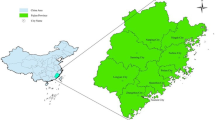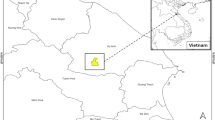Abstract
In recent years, the effects of climate change on agriculture in northern Ghana have attracted the attention of researcher and policy makers. Stakeholders including research institutions have developed several climate-smart agricultural technologies aimed at reducing the negative effects of climate change on farmers. This study examined the factors influencing rice farmers’ adoption of these technologies using Multivariate Probit and Poisson regression models. Primary data were collected from 543 rice farmers using a semi-structured questionnaire. The results revealed that the intensity of farmers’ adoption of climate-smart agricultural technologies is positively influenced by farmers’ experience in rice cultivation, access to mass media, training, and perceived decrease in the amount of rainfall. On the other hand, farm size, the distance between farmers’ residence and farm sites, location and the observed increase in temperatures negatively influenced farmers’ intensity of adoption of the technologies. This study highlights the essential role of government regarding training of farmers and awareness creation for the adoption of the climate-smart agricultural technologies.

Source: Authors’ computation of rainfall data from Ghana Meteorological Service, 2019

Source: Authors’ computation of temperature data from Ghana Meteorological Service, 2019

Source: Authors’ computation of data from SRID, Ministry of Food and Agriculture, 2019
Similar content being viewed by others
Notes
Northern, Savannah and the Upper East Regions of Ghana are part of northern Ghana.
References
Akrofi-Atitianti F, Speranza C, ILouis Bockel I, Asare R (2018) Assessing climate smart agriculture and Its determinants of practice in Ghana: a case of the cocoa production system. Land 7(1):30. https://doi.org/10.3390/land7010030
Al-Hassan RM, Kuwornu JKM, Etwire PM, Osei-Owusu Y (2013) Determinants of choice of indigenous climate related strategies by smallholder farmers in Northern Ghana. Br J Enviro Clim Change 3(2):172–187
Alhassan SI, Shaibu MT, Kuwornu JKM, Damba OT (2018a) Factors influencing farmers’ awareness and choice of indigenous practices in adapting to climate change and variability in Northern Ghana. W Afr J Appl Ecol 26(SI):1–13
Alhassan SI, Osei-Asare YB, Kuwornu JKM, Shaibu MT (2018b) Indigenous and research-based adaptation strategies of smallholder women rice farmers to climate variability in the Northern Region of Ghana. ICCCSDA 2017 Special Issue: agriculture, natural resources, and renewable energy. University of Energy and Natural Resources. J Energy Nat Resour Manag 1(1):1–17. http://www.journal.unaux.com/index.php/uenrjournal/issue/view/15
Alhassan SI, Shaibu MT, Kuwornu KMJ, Osman TD (2018c) Assessing smallholder women farmers’ adaptive capacity to climate change and variability in the Northern Region of Ghana: a composite index approach. ICCCSDA 2017 Special Issue: Environment, Technology, and Sustainable Development, University of Energy and Natural Resources. J Energy Nat Resour Manag. http://www.journal.unaux.com/index.php/uenrjournal/article/view/99
Alhassan SI, Kuwornu JKM, Osei-Asare YB (2019a) What factors influence farmers’ vulnerability to climate change and variability? Empirical evidence from smallholder women rice farmers in the Northern Region of Ghana. In: Kuwornu JKM (ed) Climate change and sub-Saharan Africa: the vulnerability and adaptation of food supply Chain Actors Publisher, Vernon Press, Series on Climate Change and Society, pp 131–156
Alhassan SI, Osei-Asare YB, Kuwornu JKM (2019b) Assessing the vulnerability of smallholder women rice farmers to climate variability in the Northern Region of Ghana: the livelihood vulnerability index approach. In: Kuwornu JKM (ed) Climate Change and Sub-Saharan Africa: the vulnerability and adaptation of food supply Chain Actors Publisher: Vernon Press, Series on Climate Change and Society, pp 29–64. https://vernonpress.com/books?sid=78
Alhassan SI, Kuwornu JKM, Osei-Asare YB (2019c) A multinomial logit analysis of farmers’ adoption of climate variability adaptation strategies: the case of smallholder women rice farmers in the Northern Region of Ghana. In: Kuwornu JKM (ed), Climate change and Sub-Saharan Africa: the vulnerability and adaptation of food supply Chain Actors Publisher: Vernon Press, Series on Climate Change and Society, pp 197–228. https://vernonpress.com/books?sid=78
Amikuzuno J, Donkoh SA (2012) Climate variability and yield of major staple food crops in Northern Ghana. Afr Crop Sci J 20(2):349–360
Arbuckle JG, Morton LW, Hobbs J (2013) Farmer beliefs and concerns about climate change and attitudes toward adaptation and mitigation: evidence from Iowa. Clim Change 118(3–4):551–563
Aryal JP, Jat ML, Sapkota TB, Khatri-Chhetri A, Kassie M, Rahut BD, Maharjan S (2018) Adoption of multiple climate-smart agricultural practices in the Gangetic plains of Bihar, India. Int J Clim Chang Strat Manag 10(3):407–427
Asfaw S. Bishop-Sambrook C, Diei Y, Firmian I, Henninger NE, Heumesser C, Huyer S, Kristjanson P, Lefter C, Lehel S (2015) Gender in climate-smart agriculture: module 18 for gender in agriculture sourcebook. In: Agriculture global practice. World Bank Group, Washington, DC
Azumah SB, Donkoh SA, Ansah IGK (2016) Contract farming and the adoption of climate change coping and adaptation strategies in the northern region of Ghana. Environ Dev Sustain. https://doi.org/10.1007/s10668-016-9854-z
Birthal PS, Kumar S, Negi DS, Roy D (2015) The impacts of information on returns from farming: evidence from a nationally representative farm survey in India. Agric Econ 46(4):549–561
Cameron AC, Trivedi PK (1998) Regression analysis of count data. Cambridge University Press, Cambridge
Chandra A, McNamara KE, Dargusch P, Damen B, Rioux J, Bacudo I (2016) Resolving the UNFCCC divide on climate-smart agriculture. Carbon Manag 7(5–6):295–299
Etwire PM, Al-Hassan RM, Kuwornu JKM, Osei OY (2013a) Application of the livelihood vulnerability index in assessing vulnerability to climate change and variability in Northern Ghana. J Environ Earth Sci 3(2):157–170
Etwire PM, Al-Hassan RM, Kuwornu JKM, Osei-Owusu Y (2013b) Smallholder farmers’ adoption of technologies for adaptation to climate change in Northern Ghana. J Agric Extension Rural Dev 5(6):121–129
Famoye F (1993) Restricted generalised Poisson regression model. Commun Stat Theory Methods 22:1335–1354
Famoye F, Wulu JT, Singh KP (2004) On the generalised Poisson regression model with an application to accident data. J Data Sci 2(2004):287–295
FAO (2015) Climate Smart Agriculture Sourcebook. Food and Agriculture Organisation (FAO), Rome, Italy, p 2015
Fentie A, Beyene AD (2018) Climate-smart agricultural practices and welfare of rural smallholders in ethiopia: does planting method matter? EfD DP. Environment for Development (pp. EfD DP 18-08). Discussion Paper Series. Retrieved April 2018
Ghana Statistical Service (GSS) (2014) Ghana living standards survey round 6 (GLSS 6). Poverty Profile in Ghana (2005–2013), Accra, Ghana
Grazhdani D (2013) Analysis of factors affecting the adoption of resource conserving agricultural technologies in Al-PRESPA Park. Natura Montenegrina Podgorica, 431–443
Greene WH (2003) Econometric analysis. Journal of the American Statistical Association, Education, P. (Ed.), Prentice-Hall, Upper Saddle River, NJ
Greene WH (2008) Econometric analysis l. (6. ed., Ed.) New Jersey, Prentice-Hall, USA
IPCC (2014) Climate change: impact, adaptation and vulnerability. contributions of working groups I, II and III to the fourth assessment report. Cambridge University Press, Cambridge
Isgin T, Bilgic A, Forster DL, Batte MT (2008) Using count data models to determine the factors affecting farmers’ quantity decisions of precision farming technology adoption. Comput Electron Agric 62(2):231–242
James R, Jones R (2015) Process-based assessment of an ensemble of climate projections for West Africa. J Geophys Res Atmos 120:1221–1238. https://doi.org/10.1002/2014JD022513
Kankam-Yeboah K, Adjei KA, Ren L, Appiah-Adjei EK, Agyapong AA (2011) Validation of TRMM data in the black volta basin of Ghana. J Hydrol Eng 17(5):647–654
Kassie M, Jaleta M, Shiferaw B, Mmbando F, Mekuria M (2013) Adoption of interrelated sustainable agricultural practices in smallholder systems: evidence from rural Tanzania. Technol Forecast Soc Chang 80(3):525–540
Kuwornu JM, Al-Hassan RM, Etwire PM, Osei-Owosu Y (2013) Adaptation strategies of smallholder farmers to climate change and variability: evidence from Northern Ghana. Inf Manag Bus Rev 5(5):233–239
Lipper L, Thorton P, Campbell BM, Baedeker T, Braimoh A, Bwalya M, Torquebiau EF, Sen PT, Sessa R, Shula R, Tibu A, Torquebiau EF (2014) Climate-smart agriculture for food security. Nat Clim Chang. https://doi.org/10.1038/nclimate2437
Lohr L, Park TA (2002) Choice of insect management portfolios by organic farmers: lessons and comparative analysis. Ecol Econ 43(1):87–99
Maddala GS (1983) Limited-dependence and qualitative variables in econometrics. Cambridge University Press, Cambridge
Maddison D (2006) The perception of and adaptation to climate change in Africa; CEEPA Discussion Paper No. 10; Centre for Environmental Economics and Policy in Africa, University of Pretoria: Pretoria, South Africa
Makate C, Makate M, Mango N (2017) Smallholder farmers’ perceptions on climate change and the use of sustainable agricultural practices in the chinyanja triangle. Southern Africa. Soc Sci 6(1):30
Marenya PP, Barrett CB (2007) Household-level determinants of adoption of improved natural resources management practices among smallholder farmers in western Kenya. Food Policy 32(4):515–536
McCarthy N, Lipper L, Branca G (2011) Climate-smart agriculture: smallholder adoption and implications for climate change adaptation and mitigation (Mitigation of climate change in agriculture series No. 4, FAO, 2011)
Ministry of Food and Agriculture (MoFA) (2017) Facts and Figures (2016): statistics, research, and information directorate (SRID), October 2018. Accra, Ghana
Nakuja T, Sarpong DB, Kuwornu JKM, Asante FA (2012) Water storage for dry season vegetable farming as an adaptation to climate change in the Upper East region of Ghana. Afr J Agric Res 7(2):298–306
Nkegbe PK, Shankar B (2014) Adoption intensity of soil and water conservation practices by smallholders: evidence from Northern Ghana. Bio-based Appl Econ 3(2):159–174
Oseni TO, Masarirambi MT (2011) Effect of climate change on maize (Zea mays) production and food security in Swaziland. Am-Euro J Agric Environ Sci 11:385–391
Sadiq MA, Kuwornu JKM, Al-Hassan RM, Alhassan SI (2019) Assessing maize farmers’ adaptation strategies to climate change and variability in Ghana. J Agric. https://doi.org/10.3390/agriculture9050090
Schaller M, Barth EI, Blies D, Röhrig F, Schümmelfeder M (2017) Climate smart agriculture (CSA): farmyard compost. International Center for Tropical Agriculture (CIAT), The Centre for Rural Development (SLE), Berlin, DE (2017), 4
Sharma A, Bailey A, Fraser I (2011) Technology adoption and pest control strategies among UK cereal farmers: evidence from parametric and non-parametric count data models. J Agric Econ 64(1):73–92
Slovin E (1960) Slovin’s formula for sampling technique
Sogoba B, Andrieu N, Howland F, Samake O, Corner-Dolloff C, Bonilla-Findji O, Zougmore R (2016) Climate-smart solutions for Mali. In: CCAFS Info Note. CGIAR Research Program on Climate Change, Agriculture and Food Security (CCAFS), Copenhagen, Denmark
Wekesa, B. M. (2017) Effect of climate-smart agricultural practices on food Security of small scale farmers in Teso North Sub-county, Kenya. A thesis submitted to Egerton University, Kenya
Wiid N, Ziervogel G (2012) Adapting to climate change in South Africa: commercial farmers' perception of and response to changing climate. S Afr Geogr J 94(2):152–173
Winkelmann R (2008) Econometric analysis of count data, 5th edn. Springer, Berlin
World Bank (2010) Economics of adaptation to climate change: social synthesis report. 1818 H Street NW, Washington DC
World Bank (2015) Climate-smart agriculture in Kenya. CSA country profiles for Africa, Asia, and Latin America and the Caribbean series. CIAT, World Bank, Washington DC, USA
Yirga C, Atnafe Y, AwHassan A (2015) A multivariate analysis of factors affecting adoption of improved varieties of multiple crops: a case study from Ethiopian Highlands, Ethiopia. J Agric Sci 25(2):29–45
Acknowledgements
We acknowledge the contributions of Agricultural Extension Officers of all districts and regional offices of the Ministry of Food and Agriculture who provided the needed support to the research team during the data collection. The authors are also thankful to all farmers who participated in the study during the data collection phase, and lastly to all the anonymous reviewers.
Author information
Authors and Affiliations
Corresponding author
Ethics declarations
Conflict of interest
On behalf of all authors, the corresponding author states that there is no conflict of interest.
Rights and permissions
About this article
Cite this article
Zakaria, A., Alhassan, S.I., Kuwornu, J.K.M. et al. Factors Influencing the Adoption of Climate-Smart Agricultural Technologies Among Rice Farmers in Northern Ghana. Earth Syst Environ 4, 257–271 (2020). https://doi.org/10.1007/s41748-020-00146-w
Received:
Accepted:
Published:
Issue Date:
DOI: https://doi.org/10.1007/s41748-020-00146-w




